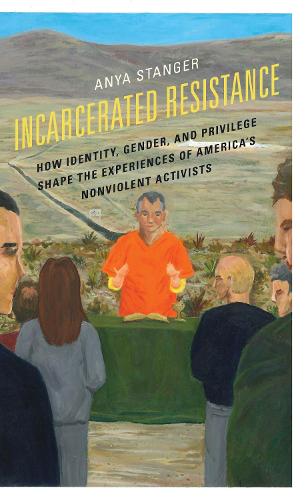
Incarcerated Resistance: How Identity, Gender, and Privilege Shape the Experiences of America's Nonviolent Activists
(Hardback)
Publishing Details
Incarcerated Resistance: How Identity, Gender, and Privilege Shape the Experiences of America's Nonviolent Activists
By (Author) Anya Stanger
Bloomsbury Publishing PLC
Lexington Books
4th January 2022
United States
Classifications
Professional and Scholarly
Non Fiction
Law: Human rights and civil liberties
Social work
Pressure groups, protest movements and non-violent action
303.610973
Physical Properties
Hardback
232
Width 160mm, Height 228mm, Spine 23mm
517g
Description
Who would go to prison on purpose
Incarcerated Resistance tells the stories of 43 activists from the School of the Americas Watch and Plowshares movements who have chosen to commit illegal nonviolent actions against the state and endure the court trials and lengthy prison sentences that follow. Employing this high-risk tactic is one of the most extreme methods in the nonviolent toolkit and typically entails intentionally breaking the law, most often through crimes of trespass onto federal property or the destruction of federal property. Though they have knowingly broken the law and generally expect to be incarcerated, their goal is to raise awareness and to resist, not necessarily to go to jail. The majority of justice action prisoners seek not-guilty verdicts, and use the space of the courtroom and subsequent media attention as opportunities to share information about their issues of concern.
Rooted in individual stories and told through a feminist framework that is attentive to relations of power, Incarcerated Resistance is as much about nuclear weapons and solidarity activism as it is about the U.S. prison system and patriarchal culture. Almost all war-resisting justice action prisoners are white, well-educated, Christian, and over the age of 60. Privilege, gender, and religious identity especially shape what happens to this committed group of nonviolent activists, as their identities may also be strategically deployed to bolster their acts of resistance, in important but fraught attempts to use privilege for good.
From the decision to act through their release from prison, nonviolent resistance illuminates the interconnected struggles required to upend systemic violence, and the ways that we are all profoundly affected by Americas deep-seated structures of inequality.
Reviews
Incarcerated Resistance offers a moving portrait of prison witness, a kind of activism that, while rare, is important for what it can teach us about the nexus of U.S. imperialism, identity and power. Stangers research exemplifies the best of feminist-activist scholarship, presenting with the utmost care what it is that justice action prisoners know and do while deftly theorizing the fraught enterprise of contesting state violence from a position of privilege.
-- Chandra Russo, author of Solidarity in Practice: Moral Protest and the US Security StateAuthor Bio
Anya Stanger currently teaches womens and gender studies and sociology at Sierra College, and conflict studies at Syracuse University.
